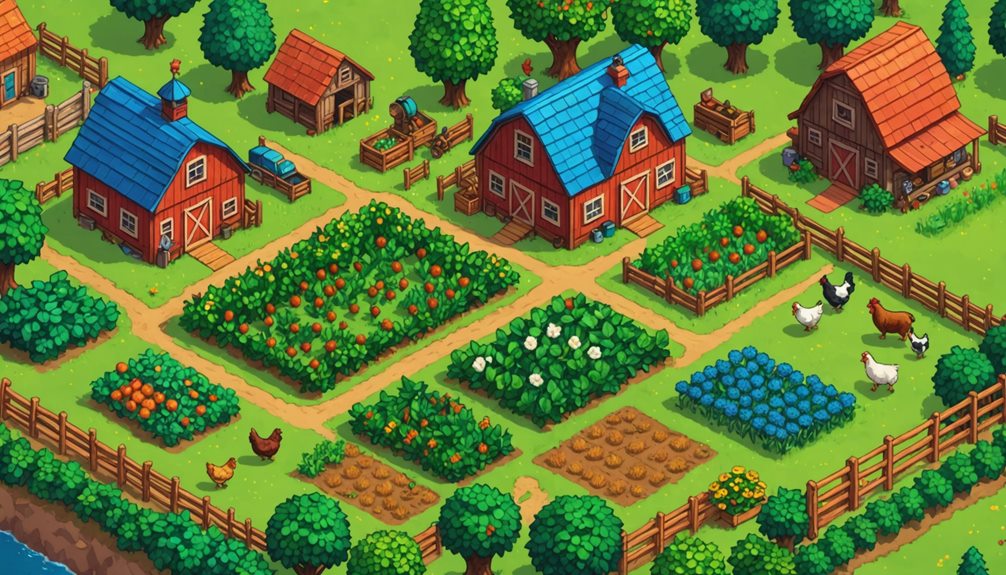In Stardew Valley, you can have up to 240 animals on your farm. However, it's vital to manage them well for maximum productivity. Each animal type, from chickens to sheep, requires specific care, including proper housing and regular attention. As your farm buildings, like coops and barns, upgrade, you'll increase your capacity for animals and improve their living conditions. Remember, happy animals produce high-quality goods, which enhance your farm's success. Balancing the number and happiness of your critters is essential, and finding out more about how to optimize your setup can truly elevate your farming experience.
Contents
Understanding Animal Limits
In the vibrant world of Stardew Valley, understanding animal limits is fundamental for maximizing your farm's potential. Each farm can house a specific number of animals, and keeping track of these limits is vital for maintaining animal happiness and optimizing productivity. You can have up to 240 animals on your farm, including chickens, cows, goats, and more.
Animal happiness plays a significant role in this equation. Happier animals produce better-quality products, such as large eggs or higher-value milk. To guarantee their happiness, you'll want to provide ample space, regular feeding, and loving attention. Each animal benefits from a cozy barn or coop, and the more animals you have, the more time you'll need to dedicate to their care.
Breeding options also add an exciting layer to managing your livestock. By focusing on specific animals, you can breed them to create new additions to your farm, enhancing your livestock variety and overall farm economy. However, remember that as you expand your animal population, keeping their happiness in check becomes even more challenging. Balancing these factors is key to thriving in your Stardew Valley adventure.
Types of Animals Available
When it comes to the types of animals available in Stardew Valley, players find a delightful variety that adds depth to farm life. These animal varieties not only enhance your farm's charm but also provide a range of product outputs, contributing to your overall success. Here's a quick look at what's available:
- Chickens: Easy to care for and great for eggs. They can be bred to produce more.
- Cows: A staple for milk production, they require seasonal care, particularly in winter.
- Goats: Similar to cows but provide goat milk, which can be turned into cheese.
- Sheep: Known for their wool, they can be bred, and their fleece can be dyed for customization.
With these animals, you have exciting breeding options that allow you to expand your farm. Each type requires specific seasonal care, keeping you engaged in daily routines. As you manage their needs and reap the benefits of their products, you'll discover that nurturing these animals brings a rewarding aspect to your gameplay, blending strategy with the simple joys of farm life.
Farm Buildings and Capacity
Managing animals effectively goes hand-in-hand with the right farm buildings and their capacities. Understanding your options for animal housing can greatly enhance your farming experience in Stardew Valley. Each building has a specific capacity that dictates how many animals you can raise.
Here's a quick overview of the primary animal housing options and their capacities:
| Farm Building | Base Capacity | Upgraded Capacity |
|---|---|---|
| Coop | 4 | 8 |
| Barn | 4 | 12 |
| Deluxe Coop | 12 | 12 |
| Deluxe Barn | 12 | 20 |
Upgrading your farm buildings not only expands the number of animals you can care for but also reveals additional features, like auto-feeding systems. As you progress, consider which upgrades best fit your farming strategy and lifestyle. Balancing your animal population with the right housing guarantees that you enjoy the freedom to expand your farm while still providing the best care for your animals. By strategically planning your farm building upgrades, you'll optimize your productivity and happiness on the farm.
Benefits of Animal Ownership
Owning animals in Stardew Valley brings a wealth of benefits that can greatly enhance your farming experience. Not only do they contribute to your farm's sustainability, but they also provide you with emotional support and valuable resources. Here are some key advantages of animal ownership:
- Health Benefits: Caring for animals encourages you to stay active and engaged, promoting a healthy lifestyle. The routine of feeding and milking can keep you on your toes!
- Economic Advantages: Animals produce high-quality organic products, like milk and eggs, which can be sold for profit, boosting your farm's income.
- Social Interactions: Building relationships with animals can enhance your social life in-game. Each animal has its personality, and the interactions can be quite fulfilling.
- Emotional Support: Animals can offer a sense of companionship, reducing stress and providing comfort during your farming journey.
Tips for Managing Animals
Effective animal management is essential for maximizing your farm's productivity and guaranteeing your furry friends are happy and healthy. Start by establishing consistent feeding schedules. Animals thrive on routine, so feeding them at the same times each day helps maintain their happiness and productivity. Make certain to invest in high-quality feed to enhance their output, like using hay or special treats.
Next, consider your breeding strategies. Planning which animals to breed and when can lead to a thriving livestock population. Keep track of their ages and health status to guarantee successful breeding outcomes.
Don't forget about happiness maintenance. Interacting with your animals daily—petting them, letting them outside, and providing shelter—builds bonds that increase their output. Happy animals produce higher-quality products, which can greatly boost your farm's income.
Lastly, always monitor your animals' health. Regular check-ups and quick responses to potential issues can prevent major setbacks. By prioritizing animal care and management, you'll create a balanced and productive farm environment that allows you the freedom to explore all the possibilities Stardew Valley has to offer.
Frequently Asked Questions
Can I Sell My Animals in Stardew Valley?
You can't sell your animals directly in Stardew Valley, but you can breed them for profit. Keep their happiness high to guarantee healthy offspring, maximizing your farm's potential while enjoying the freedom of animal husbandry.
Do Animals Produce Goods Every Day?
Animals don't produce goods daily, but with proper animal care, you can maximize product quality. Each animal has a schedule, so make certain you feed and pet them regularly to enhance their output and happiness.
What Happens if I Neglect My Animals?
If you neglect your animals, you'll find their happiness plummeting, leading to less productive days. Ignoring feeding schedules isn't the freedom you hoped for; it just results in sad, unproductive companions waiting for your attention.
Can I Move My Animals to a Different Farm?
You can't move animals to a different farm, but you can optimize your current layout. Consider animal relocation strategies within your farm to enhance productivity and guarantee your critters have comfortable, accessible spaces.
Are There Any Animal-Related Achievements in the Game?
You might think animal care is just a chore, but it's rewarding! In Stardew Valley, you can earn achievements by ensuring your animals' happiness, like "The Great Farmer" or "Livestock Legend." Enjoy the journey!
Conclusion
In Stardew Valley, the joy of animal husbandry is like tending to a vibrant garden of companionship. With a limit of 20 animals, you can cultivate a lively menagerie that brings both profit and pleasure. By understanding your farm's capacity and the unique benefits each animal offers, you'll create a harmonious ecosystem. So, roll up your sleeves, embrace the clucking and mooing, and watch your farm flourish as you nurture your furry friends!

Alma J. Lillard is a passionate writer and gaming enthusiast who brings her deep love for Stardew Valley to every piece she creates. As a contributor to StardewUpdate.Today, Alma covers the latest updates, tips, and in-depth guides for players looking to enhance their Stardew Valley experience.

